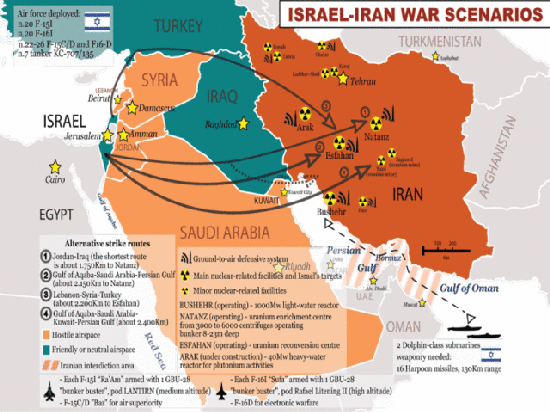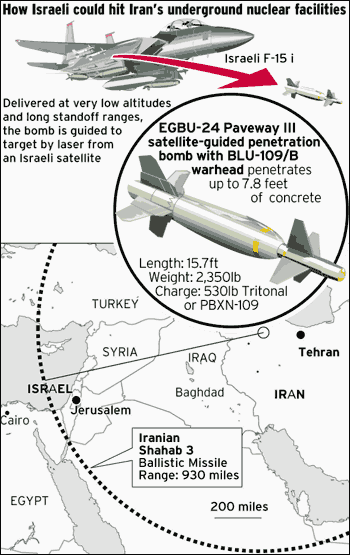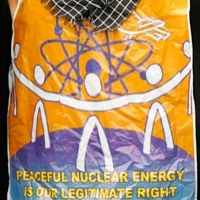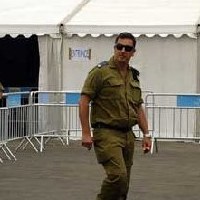Mon, June 21, 2010 | Intelligence and Terrorism Information Center
Scenarios for an Israeli attack in Iran: view from Tehran
This week, news website Asr-e Iran has published a commentary article by commentator Seyyed Ziaoldin Ehtesham, discussing the various possible scenarios following an Israeli attack on Iran’s nuclear facilities. The article first presented an optimal scenario for Israel: Israeli fighter planes arrive from Jordan, northern Saudi Arabia, and southern Iraq, and attack four targets simultaneously: the uranium enrichment facility in Natanz, the uranium enrichment facility near the city of Qom, the heavy water reactor in Arak, and the uranium conversion facility in Esfahan. The four sites are destroyed in several minutes, the fighter planes safely return to base, and the pilots receive a hero’s welcome back home. The Iranian government holds an emergency meeting, condemning the Israeli attack as a blatant violation of international law. The Iranian representative to the UN also releases a strong-worded announcement against Israel. Anti-Israeli protests are held in Iran, with the protestors chanting “death to Israel”. Several countries in the world support the Israeli attack, calling it a necessary act of self-defense. Other countries condemn the attack, while still others remain silent. After several days of extensive media coverage of the destruction of Iran’s nuclear facilities by Israel, the situation settles down and things go back to normal.
However, it is the commentator’s view that this scenario is far from what would actually happen. Iran of 2010 is not Iraq of 1981, and the consequences of the Israeli attack on the nuclear reactor in Iraq cannot be compared to those of an Israeli attack in Iran. Iraq was busy fighting Iran and had no desire to confront Israel. Iran, however, is focusing all of its military and defensive plans on the threat posed by Israel, it has the political willpower and national ability to launch a military response to any Israeli attack, and it will never settle for a diplomatic response to a military attack by Israel.
The Iranian response will be reflected in asymmetrical warfare. Israel’s nuclear facilities may be the first victim of an Israeli attack on Iran. Even if Israel believes it has the ability to protect its nuclear facilities, there is nothing it can do against various kinds of rockets coming in from various directions. Iran is likely to surprise Israel, just as Hezbollah surprised it in the “second Lebanon war”.
Even if Israeli fighter planes reach Iran, they will face a difficult, complicated mission. First, Iran’s air defense system will put the Israeli pilots face-to-face with a new and unfamiliar reality. Second, the nuclear facilities are hidden in various sites across Iran, some of them deep underground, and they are defended by missiles and anti-aircraft defense systems. Even if some of the planes made their way back, there is no guarantee that they would be able to return to Israel. There is no question that the Iranian missiles will hit Israel’s air force bases even before the planes return to Israel, and the pilots may not be able to contact their control towers, which would be destroyed minutes after an Israeli attack.
According to the commentator, news agencies in the world will report simultaneously on the Israeli attack in Iran and the Iranian counter-attack that will follow immediately. After the Iranian response, Israel will have two choices: first, remaining silent over the strong Iranian response and accepting the restoration of the nuclear facilities and the continuation of Iran’s nuclear activity, which would mean a strategic defeat for Israel. Second, continuing the attacks on Iran, which would mean broadening the conflict with it. A war between the two countries would result in widespread destruction in Iran; however, such a war would spell the end of Israel. Unlike the Israelis, who would never be able to cope with sustained warfare, the Iranians lived through an eight-year war against Iraq. A war like that would set Israeli cities ablaze and erase all that Israel has created in the past six decades to attract Jews from all over the world. The commentator concluded by saying that the first bomb Israel were to drop on Iran would begin a process of changing the political map of the Middle East, sparking a fire in the region that would affect the whole world—directly or not (Asr-e Iran, June 14).



 RSS
RSS













Scenarios for an Israeli attack in Iran #israel #iran #jcot http://j.mp/cGYbSX
Scenarios for an Israeli attack in Iran #israel #iran #jcot http://j.mp/cGYbSX http://ff.im/mtMR7
[…] Scenarios for an Israeli attack in Iran | Middle East Affairs … […]
RT @CrethiPlethi: Scenarios for an Israeli attack in Iran #israel #iran #jcot http://j.mp/cGYbSX
[…] Scenarios for an Israeli attack in Iran | Middle East Affairs … […]
RT @CrethiPlethi: Scenarios for an Israeli attack in Iran #israel #iran #jcot http://j.mp/cGYbSX
[…] Scenarios for an Israeli attack in Iran | Middle East Affairs … […]
RT @CrethiPlethi: Scenarios for an Israeli attack in Iran #israel #iran #jcot http://j.mp/cGYbSX http://ff.im/mtMR7
RT @CrethiPlethi: Scenarios for an Israeli attack in Iran #israel #iran #jcot http://j.mp/cGYbSX
اسراییل ت.ان مقابله نظامی با ایران قدرمند را نخواهد داشت چرا که اولا” ایرانیان با روحیه شهادت طلبی و قوی خود اثبات نمودند که به هیچ عنوان اجازه ورد کشور متخاصم به خاک خود را نخواهند داد و دوما” برخلاف ادعای منابع غربی، جمهوری اسلامی ایران روز به روز بر دانش بومی خود افزوده و تسلیحاتی به مراتب قویتر و مدرن تر نسبت به نمونه های غربی خود ساخته است و سوم اینکه حمله اسراییل به ایران، منجر به نابودی این رژیم جعلی، ضربات مهلک به هم پیمانان آن و فشار اقتصادی سنگین به جهان از طریق اهرم نفت خواهد شد